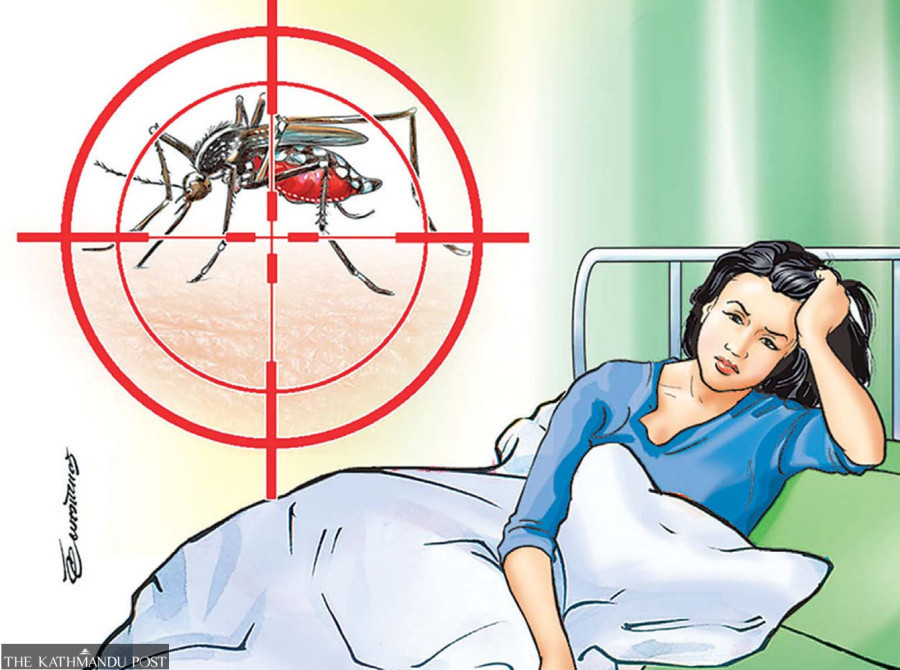Health
57 districts report dengue infection
Over 50 cases are being reported per week. Experts warn of big outbreak in coming days.
Post Report
As pre-monsoon rains pick up pace, concerns mount about an imminent outbreak of the dengue disease. All that is required for the disease to flare up are stagnant water and hot temperatures, both already present in various parts of the country.
“Dengue vectors are already there in many places across the country,” said Professor Murari Das, an entomologist at the BP Koirala Institute of Health Sciences.
“With the right conditions like water and warmth required for vector breeding available now, we can expect a spike in dengue cases in the coming days.”
Dengue is a viral disease transmitted by female Aedes aegypti and Aedes albopictus mosquitoes. The same vectors also transmit chikungunya, yellow fever, and Zika virus, according to the World Health Organisation.
The Epidemiology and Disease Control Division said that 57 districts, including three districts of Kathmandu Valley—Kathmandu, Lalitpur, and Bhaktapur—have already reported cases of dengue infection.
“On average, around 50 people across the country are becoming infected with the dengue virus every week,” said Dr Gokarna Dahal, chief of the Vector Control Section at the division. “The number could rise in the coming days, as pre-monsoon rainfall activities have recently increased.”
Post-monsoon is considered a high transmission season for dengue, but Nepal has witnessed outbreaks of the deadly disease throughout the year, making the country endemic to the virus.
Around 1,000 people have already been infected with the deadly disease since the start of 2024, according to officials.
Public health experts say reported cases could be just the tip of the iceberg, as around 80 percent of people infected with the deadly virus do not show any symptoms.
Many people infected with dengue show mild symptoms and do not need treatment or can be treated with paracetamol at home.
Last year, at least 20 persons died and more than 52,000 were infected by the virus, which had spread to all 77 districts.
In 2022, a total of 88 people died and over 54,000 were infected by the virus throughout the country. At the time, hospitals in the Kathmandu Valley were overwhelmed with dengue patients and pharmacies had run out of paracetamol, the most widely used medicine to treat fever.
In 2019, the disease killed at least six people and more than 16,000 were hospitalised across the country. The virus had spread to 68 districts at the time.
Experts say that this is the right time to prepare and prevent possible outbreaks in the coming days.
They say that it will be too late if they wait for a massive outbreak. Authorities concerned should launch an awareness drive, step up vector surveillance and take other measures to cut the risk, according to them.
Health Ministry officials said that they have alerted all agencies concerned about the risk of a dengue outbreak.
“We have alerted all relevant agencies about the risk of a dengue outbreak in the coming days,’ said Dahal.
Authorities and agencies at some local units have started activities to make people aware of the risks, and we have urged all health agencies to take preventive measures, including launching an awareness drive.”
Dengue has become endemic in Nepal, as cases of infection are reported throughout the year. Epidemiologists and virologists say the dengue virus has emerged as a major public health issue in Nepal. They also say that despite thousands of people getting infected and scores dying from the disease, the authorities are yet to take it seriously.
They believe that this lackadaisical approach is responsible for the spread of the virus. What authorities concerned do most of the time is count the number of infections and deaths, according to them.
They said measures such as search-and-destroy and awareness drives should be initiated to contain the spread of virus-spreading vectors.
Dengue-transmitting mosquitoes breed in clean water and bite people in daylight. Uncovered water tanks and other discarded objects, such as plastic cups and bottles, could be breeding grounds for these mosquitoes.
Symptoms of dengue include mild to high fever, severe muscle pain, rashes, severe headache and pain in the eyes, doctors say. Patients with these symptoms are advised to seek immediate treatment. While there is no specific cure for the disease, early detection and access to proper medical care can prevent death.




 25.96°C Kathmandu
25.96°C Kathmandu














